Russia expands its strategic footprint in occupied Abkhazia
The reopening of the decades-closed Sukhumi Babushara Airport and a test flight from Moscow demonstrate Russia’s push for control over occupied Abkhazia
Russia expands its strategic footprint in occupied Abkhazia
Share this story
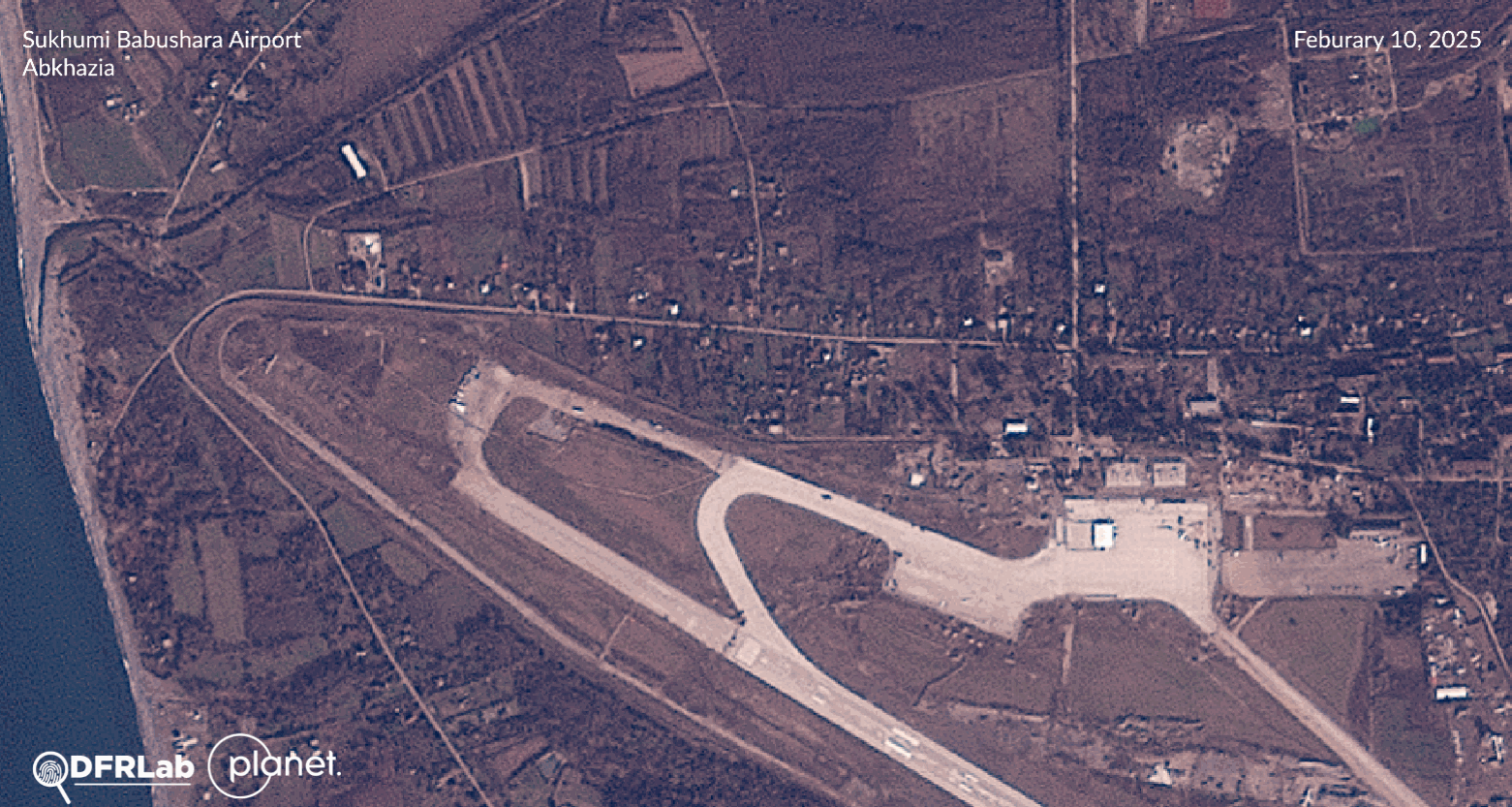
BANNER: Satellite imagery shows a new road and the demolition of buildings at Sukhumi Babushara Airport (Source: @DFRLab via Planet)
The February 7 test flight from Moscow to the long-closed Sukhumi Babushara Airport reignited discussions over Russia’s interests in Abkhazia and its growing control over the region’s infrastructure. Considering the strategic location of Abkhazia’s coastline in the context of Russia’s war in Ukraine, reopening the airport fits into Moscow’s broader strategy of solidifying influence in the Black Sea region through economic, political, and military means.
The Sukhumi airport was closed in 1993 due to security concerns after Russian-backed separatists downed civilian aircraft. In 2008, the Sukhumi airport was used by separatist forces backed by the Russian military. At that time, Russian paratroopers were relocated to the airport, signifying its strategic value.
The airport is scheduled to reopen by May, a significant development representing a direct challenge to Georgia’s sovereignty. Abkhazia has been under Russian occupation and controlled by Russia-backed separatists since the 1992–1993 war. Along with South Ossetia, Moscow recognized Abkhazia’s independence after the 2008 invasion of Georgia, though the international community continues to affirm Georgia’s territorial integrity.
The airport reopening comes amid broader Russian efforts to entrench control over Abkhazia’s economy and infrastructure. Ahead of Abkhazia’s de facto presidential elections in early 2025, Badra Gunba, a presidential candidate at the time, visited Moscow, where he secured pledges of financial and energy support from Russian officials. Russian Minister of Foreign Affairs Sergei Lavrov framed the airport’s reopening as a step toward boosting tourism and trade. These developments followed a political and energy crisis in late 2024, when an unresolved investment deal led to unrest in Abkhazia; the deal granted Russian investors significant tax breaks and property rights in Abkhazia. Russia, which controls Abkhazia’s energy supply, used this dependency as leverage. Experts argue that the airport’s reopening deepens Abkhazia’s economic reliance on Moscow, reinforcing Russia’s influence and annexation goals.
Georgia’s Ministry of Foreign Affairs, in its statement following the 63rd round of the Geneva International Discussions on March 4–5, 2025, expressed concern over the humanitarian and human rights situation in the occupied regions, as well as the ongoing illegal militarization—citing the plans to reopen the Sukhumi airport and the construction of a Russian naval base in Ochamchire. On March 14, the Georgian Civil Aviation Agency (GCAA) warned that flights to occupied Abkhazia would violate international aviation norms and breach the Convention on International Civil Aviation. At the time of writing, these were the only official responses from Georgian authorities. The ruling Georgian Dream party has not commented on the airport’s reopening, drawing criticism from experts who argue that the government’s silence weakens Georgia’s non-recognition policy, which seeks to prevent international recognition of the self-declared independence of Abkhazia and South Ossetia and reinforces support for Georgia’s territorial integrity.
The renewed discussions on reopening the Sukhumi airport also unfolded against the backdrop of a Georgian Dream–led parliamentary commission investigating the alleged crimes of the previous administration, the United National Movement (UNM). In March 2024, the commission hearings echoed a long-standing disinformation narrative that claims Georgia, via the UNM, not Russia, started the 2008 war by bombing “sleeping Tskhinvali.” On March 25, Abkhazia responded to the GCAA statement, expressing disappointment and referencing statements from Georgian politicians who had signaled their readiness for dialogue. The statement also recalled a speech by the Georgian Dream’s honorary chairman, Bidzina Ivanishvili, delivered in Gori in September 2024, in which he called the war a well-planned provocation from the outside, claimed that Georgia should apologize to Ossetians, and vowed to punish the UNM.
The airport reopening could also be considered a step toward expanding Russia’s strategic foothold along the Black Sea’s northern coast. The coastline is a popular Russian tourist destination and may benefit from Sukhumi airport as a secondary or backup hub for the Sochi International Airport. While Russian media reports emphasize Sukhumi airport’s civilian function and provide no indication of a military role, its potential strategic value cannot be overlooked. Russia already maintains a military base in Abkhazia’s Gudauta and is expanding its naval presence in the Ochamchire port. In March 2022, soon after invading Ukraine, Russia deployed units from its military bases in Georgia’s occupied regions of Abkhazia and South Ossetia, including from the Gudauta base. Ochamchire is located about 30 km from the administrative boundary line with Georgia and offers a sheltered coastline suitable for stationing smaller naval vessels, which is especially noteworthy after Russia’s Black Sea Fleet suffered losses in Crimea due to Ukrainian attacks. In July 2024, Bellingcat reported that after the attacks on Novorossiysk, Russia moved its Project 22870 tugboat from Novorossiysk to the Ochamchire naval base, marking the first ship from the Russian Navy to utilize the occupied Georgian base. The base allows Russia to operate closer to the Georgia-controlled coast and NATO-allied waters while reducing reliance on Sevastopol, which remains vulnerable. This development increases the risk of Georgian territory being caught in military operations, contradicting the Georgian government’s claim that it is the West that wants to drag Georgia into war.
Test flight and airport infrastructure
The agreement for the reconstruction of Sukhumi airport and the restoration of air traffic between Russia and Abkhazia was signed at the Saint Petersburg International Economic Forum in 2023. The project is backed by investor Rashid Nurgaliyev Jr., the son of Rashid Nurgaliyev Sr., a former Russian interior minister and the current first deputy secretary of the Russian Security Council. Nurgaliyev Sr. is subject to Western sanctions due to his involvement in Russia’s war in Ukraine.
According to Ekho Kavkaza, which is part of the Radio Free Europe/Radio Liberty network, Nurgaliyev’s company, Infrastructural Development, was granted significant privileges—all construction materials and equipment, including aviation fuel and aircraft maintenance supplies, were exempt from customs duties. Additionally, infrastructure development was exempt from property and profit taxes for up to 25 years during the cost recovery period. For electricity usage, the Russian company agreed to pay a preferential tariff rate similar to that of Abkhazia’s most privileged entities, such as schools and hospitals. Media reports estimated the cost of the first phase of reconstruction, primarily focused on the main runway, at approximately ₽6.5 billion ($72 million). According to OC-Media, the construction work began in March 2024, with the full reopening initially planned for the end of 2024 but then delayed to May 2025.
On February 7, a test flight operated by the sanctioned Russian airline UVT Aero flew then-presidential candidate Gunba back to Sukhumi from Moscow, along with Abkhazian students studying in Moscow. The flight was met with celebrations and extensive television coverage, which showcased ongoing construction work along the runway. Media reports also featured a construction model illustrating the planned developments within the airport complex.

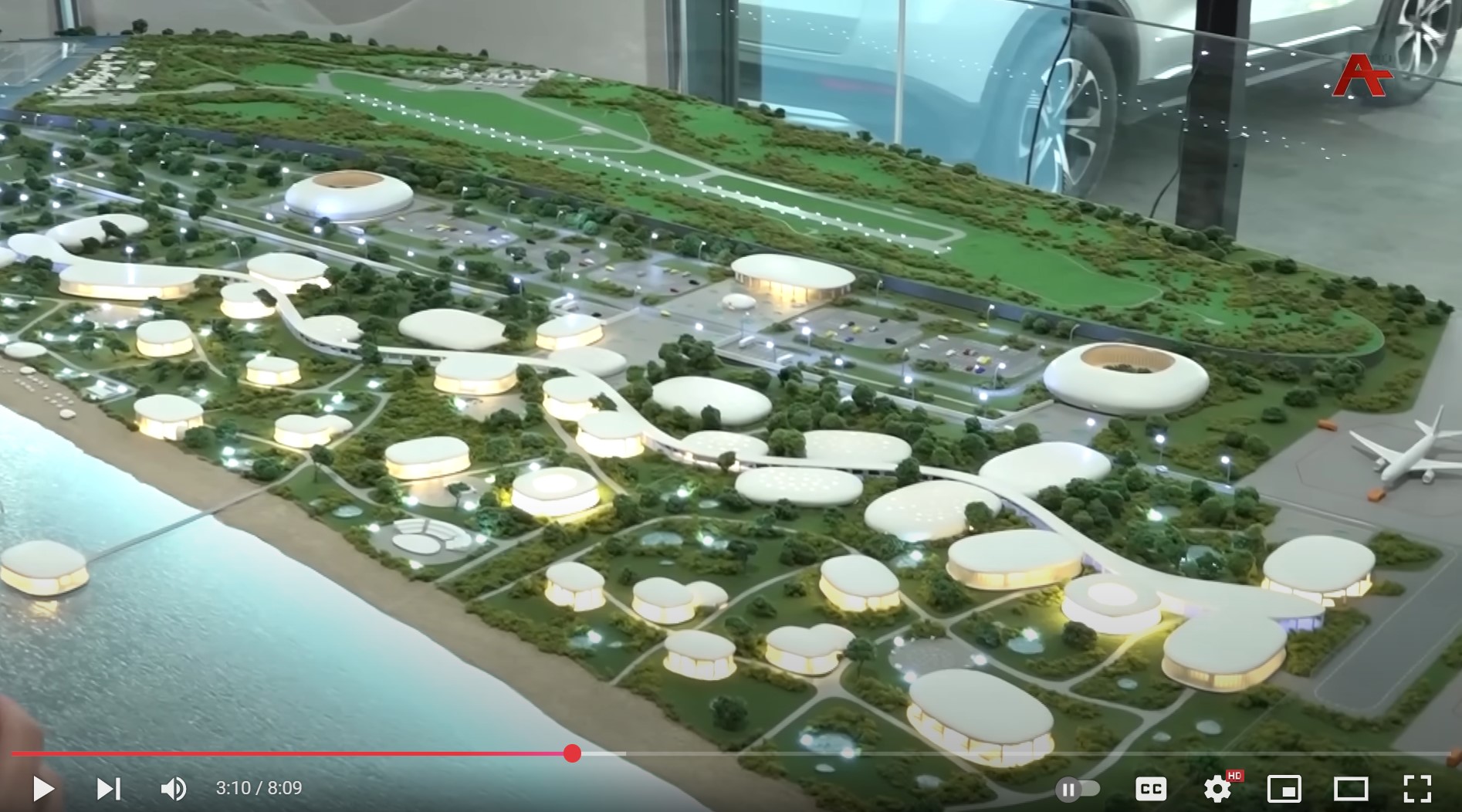
Throughout 2024 and early 2025, Sukhumi airport underwent significant renovations. In the summer of 2024, a new road was constructed around the runway, expanding the accessible terrain for vehicles and connecting to a newly paved surface northwest of the airstrip. Additionally, an increase in vehicle activity was observed in the days leading up to the February 7 flight between Russia and Abkhazia.

Local Russian skydiving company shares dubious content linked to paramilitary organizations and humanitarian convoys in occupied Ukrainian territories
Multiple sources on social media and Yandex Maps indicated that Sukhumi airport was reportedly used by the local skydiving company “SkyComp.” The company’s social media presence on OK.ru and VKontakte (VK) suggested that as early as September 2024, it had utilized the airfield for recreational activities. In a 2019 article posted by the Russian weather forecaster Top Rated, the head of SkyComp poses in front of an aircraft belonging to Russia’s Volunteer Society for Assistance to the Army, Aviation, and Navy (DOSAAF), which is a paramilitary sports organization that provides members with access to military-grade aircraft. More recent photos show the head of SkyComp in a paratrooper uniform in 2024.
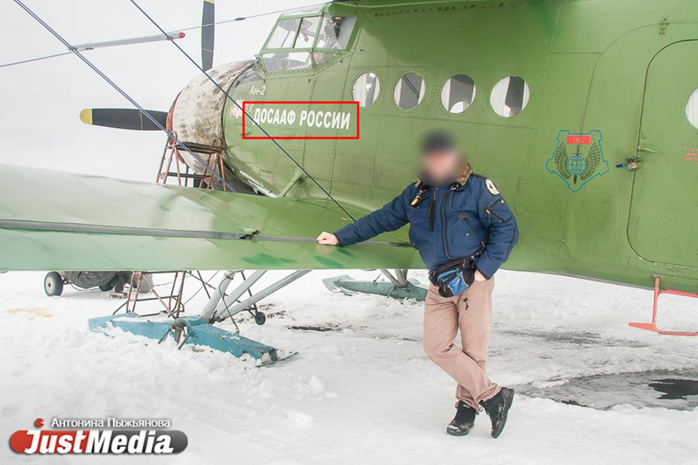
In addition, a skydiver whose photos appear on a SkyComp’s OK.ru album also posted a video on VK onboard the same DOSAAF Antonov An-2 aircraft.
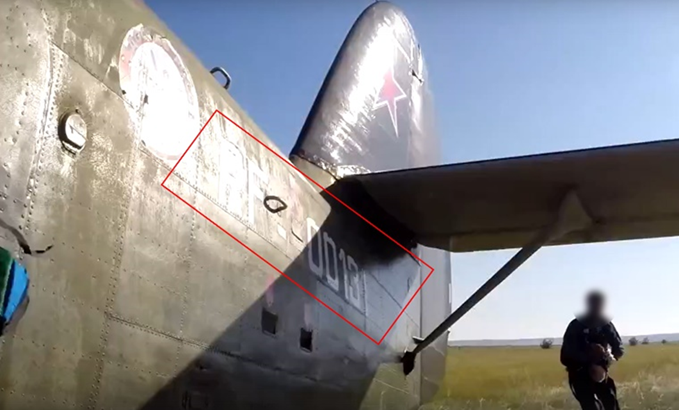

According to Ukraine’s Main Intelligence Directorate, DOSAAF has reportedly been implicated in war crimes, including the “deportation and forced displacement of Ukrainian children” in the occupied Ukrainian regions.
Other social media posts by the owner of SkyComp feature a volunteer from Bashkortostan who reportedly visited Mariupol, Donetsk, and other Ukrainian territories under Russian occupation, indicating a plausible relationship between the two individuals. On one occasion, the local newspaper Kuyurgaza, which reported on volunteer convoys to Donbas, mentioned that “[the volunteer] is a representative of another caring voluntary community, which unites guys who served in the border troops. Knowing firsthand about the hardships of military service, they helped Donbas even before the start of the special operation […].” Additionally, a 2018 Kuyurgaza article revealed that this individual served in the Soviet Army in Afghanistan in 1985.
Photos posted on OK.ru by SkyComp appear to be unique and unredacted, suggesting they were obtained through direct contact between the two men, especially when compared to redacted footage shared by the local newspaper.
Furthermore, an OK.ru profile matching the birth date and birthplace of the mentioned volunteer is listed among SkyComp’s followers.
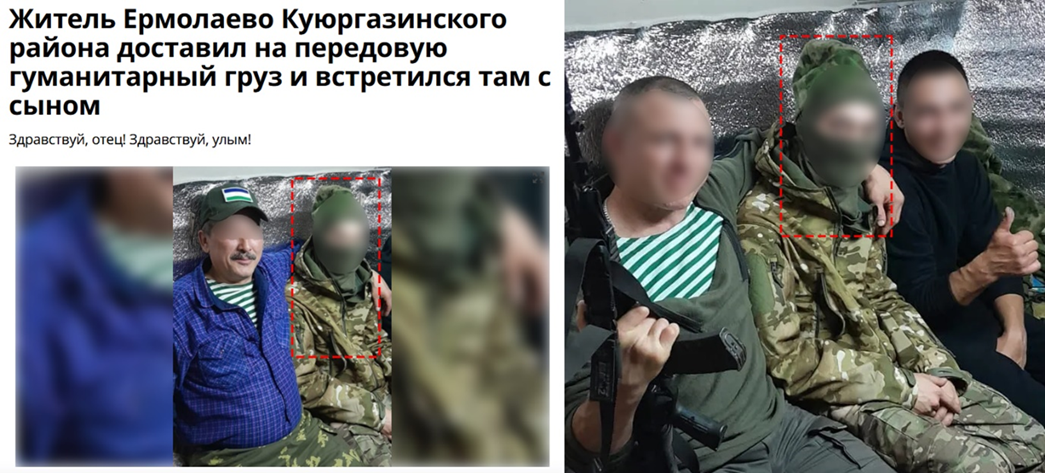
These observations highlight patterns of association but do not confirm a coordinated relationship between SkyComp, DOSAAF, and activities in occupied Ukrainian territories.
Concrete building completed in Abkhazian military base under Russian control
Meanwhile, in Gudauta, the Russian armed forces completed construction on a large concrete structure that had been in progress for several years. Gudauta airbase hosts Russia’s 7th Military Base, which houses artillery and air force equipment.
According to Wikimapia, the base also contains S-300 missile systems, military equipment fleets, an ammunition storage facility, and multiple officers’ dormitories. Planet Labs satellite imagery reviewed by the DFRLab confirms that a new 2,000-square-meter concrete building was completed in early 2025. This structure is located near a military medical clinic and other facilities used by Russian military personnel.
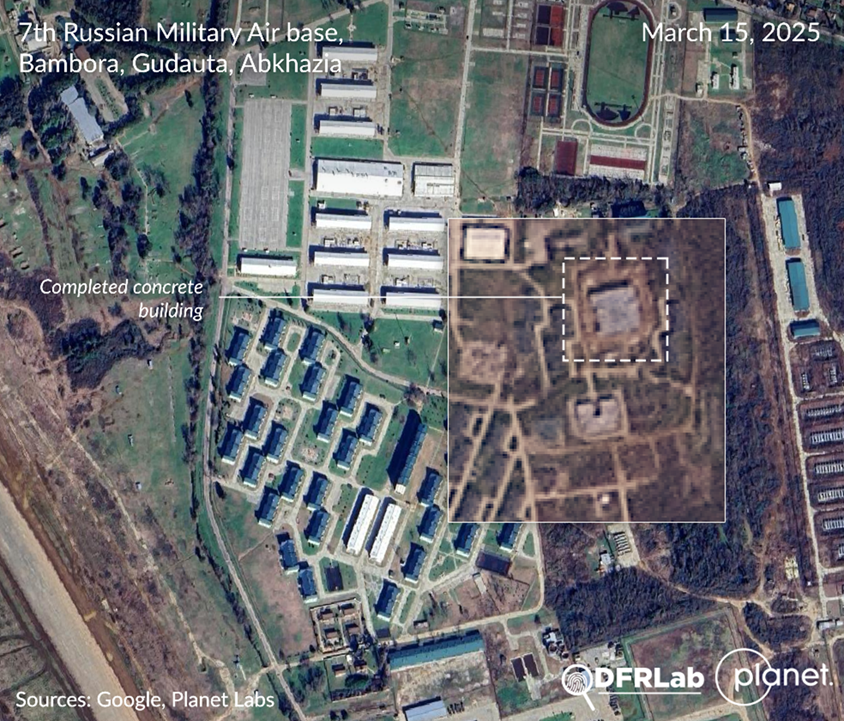
Earlier constructions, located next to reported medical facilities and the officers’ dormitory, had been completed between 2015 and 2019. Google Earth images retrieved from those years show the completion of those buildings, despite their exact function remaining unclear. The central building, which was completed during the first quarter of 2025, appears to have been part of the same construction plan as the other buildings but may have seen its completion delayed.
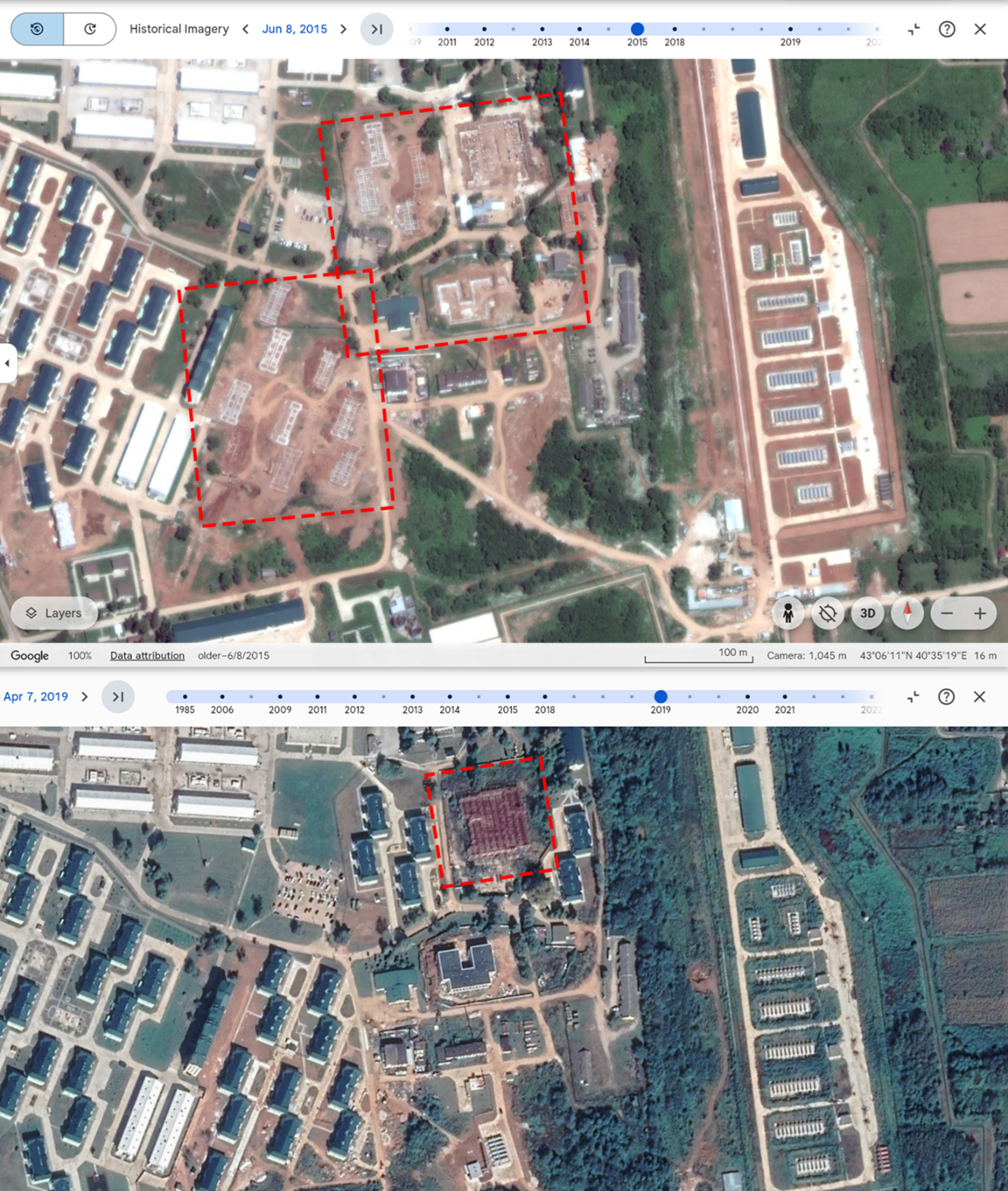
Cite this case study:
Sopo Geleva and Valentin Châtelet, “Russia expands its strategic footprint in occupied Abkhazia,” Digital Forensic Research Lab (DFRLab), April 17, 2025, https://dfrlab.org/2025/04/16/russia-expands-its-strategic-footprint-in-occupied-abkhazia/.

